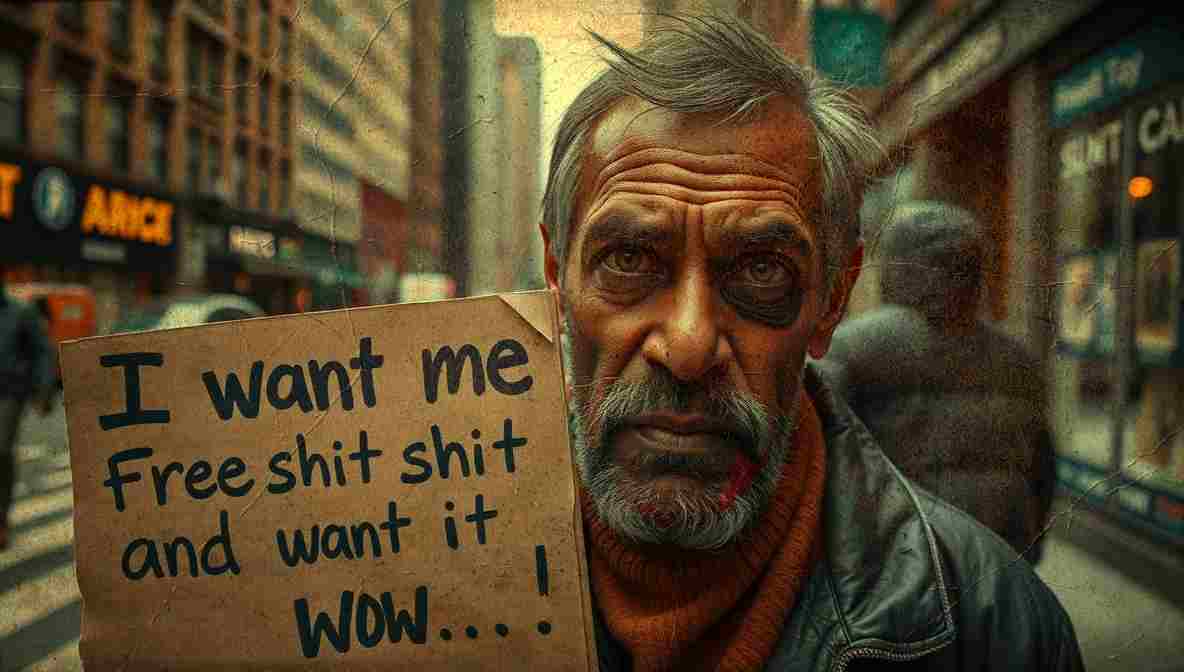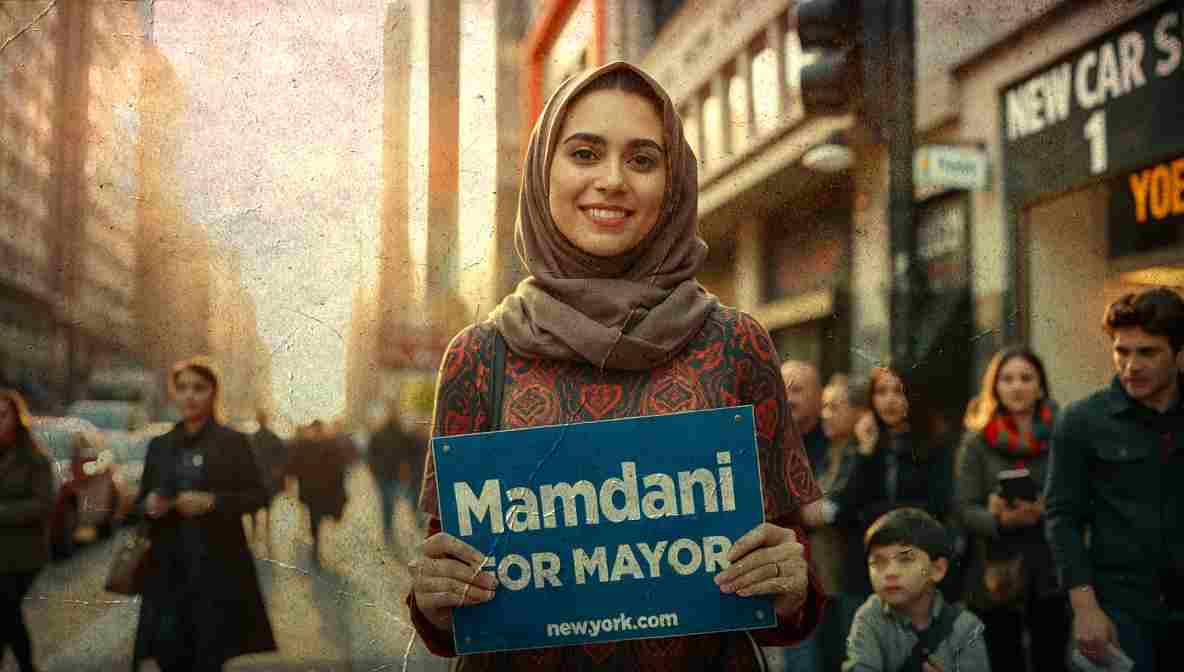Wall Street’s Nightmare Scenario: What a Mamdani Victory Means for NYC’s Financial Elite
Hedge Fund Managers Practice Crying Into Slightly Smaller Money Piles
In conference rooms across Lower Manhattan, financial executives are experiencing what psychologists call “impending accountability disorder,” a condition triggered by the possibility that Zohran Mamdani might win the NYC mayoral race and implement the horrifying concept of expecting rich people to pay for things. The financial sector has responded by threatening everything from business exodus to economic apocalypse, which is basically their version of writing a strongly worded letter.
Wall Street’s nightmare isn’t really about money. These people have more money than God’s accountant. The nightmare is about precedent. If New York starts making billionaires contribute to infrastructure, education, and public services, what’s next? Worker protections? Environmental regulations? Not crashing the global economy every ten years? The horror.
The Great Manhattan Exodus That Happens Every Election
“They threaten to leave every time,” Dave Chappelle said at his show. “Every single time someone proposes a tax, Wall Street’s like, ‘We’re leaving! We’re going to Florida!’ Cool. Go to Florida. See how long you last before the hurricanes and the humidity make you miss paying taxes. Six months later they’re back like, ‘We’ve made a huge mistake.'”
The business exodus threat has been deployed so many times it has its own Wikipedia page. Every mayor, every tax proposal, every regulation produces the same predictable tantrum. And yet, mysteriously, Wall Street is still here, making money and complaining about the conditions that allow them to make money.
Tax Increases or the End Times? Both According to Goldman Sachs
Financial analysts have produced reports suggesting that Mamdani’s proposed 2% wealth tax would trigger everything from market collapse to the return of disco. The reports, funded by the people who would pay the tax, conclude that making rich people contribute to society would somehow destroy society. It’s the kind of circular logic that gets you a job at a think tank.
“A 2% tax will destroy New York,” Bill Burr said on his podcast. “That’s what they’re claiming. Two percent. Not fifty percent. Not twenty percent. Two. And these guys are acting like it’s the French Revolution. Meanwhile, the rest of us are paying more than 2% on everything we buy. But sure, let’s worry about the billionaires. They’re really struggling.”
Real Estate’s Collective Panic Attack
The real estate industry has joined the panic, warning that Mamdani’s affordable housing proposals would crash the market. Developers who have spent decades building luxury condos that sit empty as investments are suddenly concerned about housing policy. It’s touching, really, like watching bank robbers worry about crime rates.
“Real estate developers pretending to care about housing,” Trevor Noah said. “That’s my favorite. They build apartments for Russian oligarchs and Chinese billionaires, leave them empty as piggy banks, and then act shocked when New Yorkers can’t afford rent. Now Mamdani wants to build actual housing for actual people and they’re like, ‘This is communism!’ No, bro, this is shelter. It’s called civilization.”
When Affordable Housing Threatens Unaffordable Profits
Developers have threatened to stop building if Mamdani wins, which is essentially threatening to stop doing the thing they’re not doing anyway. New housing construction in NYC has focused almost entirely on luxury units, making the threat to stop building affordable housing particularly empty since they never started.
“They’re gonna stop building affordable housing,” Chris Rock said. “What affordable housing? Have you seen rent in New York? There is no affordable housing. They’re threatening to stop doing something they’re not doing. That’s like me threatening to stop going to the gym. Brother, I don’t go to the gym. You can’t stop what you never started.”
Financial Sector Discovers They Might Need to Contribute
The real panic on Wall Street isn’t about taxes. It’s about the fundamental shift in power dynamics. For decades, the financial sector has essentially dictated policy to city government. Mamdani’s platform suggests the revolutionary idea that maybe the city should work for people who live here, not just people who own here.
“Wall Street’s used to running things,” Amy Schumer said during her show. “They’re used to calling the mayor and getting what they want. Now there’s a guy running who doesn’t care what they want. He cares what the people who voted for him want. That’s called democracy. It’s a foreign concept to them. Like labor laws or paying workers.”
The Business Climate or Just the Climate of Business
Executives have warned that Mamdani would damage New York’s “business climate,” which is code for “we might have to follow rules.” The business climate they’re protecting is one where financial crimes get settled with fines, wage theft is standard practice, and contributing to infrastructure is considered radical.
“Business climate,” Kevin Hart said at Madison Square Garden. “That’s what they call it when rich people don’t want to follow laws. ‘Oh no, the business climate!’ The climate’s fine. The weather’s fine. What’s not fine is expecting to not pay taxes while using public roads, public schools, and public services. That’s not climate change, that’s common sense.”
The Exodus That Never Happens
Despite decades of threats to leave, Wall Street firms never actually go anywhere. They threaten to move to Florida, Texas, or Connecticut, and then they remember that those places aren’t New York and quietly stay put. It’s the corporate equivalent of a teenager threatening to run away and then realizing they don’t know how to do laundry.
“They can’t leave,” Ricky Gervais said from London. “Where are they gonna go? Florida? Have you been to Florida? It’s nice to visit, but living there? That’s a threat, not a destination. Texas? Good luck with the power grid. Connecticut? That’s just New York’s suburbs pretending to be a state. They’re not going anywhere.”
London’s Laughing, Literally
European financial centers have watched New York’s meltdown with bemusement. Cities like London and Frankfurt manage to maintain thriving financial sectors while actually taxing wealth and providing public services. The idea that reasonable taxation would destroy business is uniquely American.
“You Americans are hilarious,” Ricky Gervais continued. “We have higher taxes, universal healthcare, and better infrastructure. And guess what? Rich people still live here. They’re still rich. They just contribute to society. I know, crazy concept. But somehow London hasn’t collapsed into the ocean.”
The Math They Don’t Want You to Do
A 2% wealth tax on billionaires would affect roughly 100 people in New York City. That’s it. One hundred people. The financial sector’s entire panic is about protecting one hundred individuals who have more wealth than they could spend in multiple lifetimes. It’s the smallest violin playing for the richest audience.
“One hundred people,” Sarah Silverman said. “That’s who they’re worried about. Not the millions who can’t afford rent. Not the kids in underfunded schools. Not the crumbling subway. One hundred billionaires. And we’re supposed to structure our entire city around keeping them happy. That’s not democracy. That’s oligarchy with a MetroCard.”
When Paying Fair Share Becomes Unfair Treatment
The financial elite have framed taxation as discrimination, which requires redefining discrimination to mean “being asked to contribute.” By this logic, traffic laws discriminate against speeders and murder laws discriminate against murderers. It’s technically true but misses the point entirely.
“They’re calling taxes discrimination,” Jerry Seinfeld said at the Comedy Cellar. “Discrimination! Like they’re a protected class. ‘I’m being discriminated against because of my wealth.’ No, you’re being asked to pay for the society that enabled your wealth. That’s not discrimination, that’s a bill. Pay your bill.”
The Fear of Democratic Accountability
What Wall Street really fears isn’t Mamdani’s policies. It’s the precedent of a politician who doesn’t answer to them. For years, mayoral candidates have promised change and then immediately called JP Morgan to ask permission. Mamdani’s campaign suggests he might actually implement the platform he runs on, which would be unprecedented in recent memory.
“They’re scared he means it,” Tom Segura said during his show. “Most politicians campaign on helping people and then govern for corporations. Mamdani seems like he actually wants to help people. And then continue helping people. While governing. What a concept. Wall Street’s like, ‘Wait, you can do that? That’s allowed?'”
The Cost of Actually Governing for Citizens
If Mamdani wins and implements his platform, it would represent a fundamental shift in how New York operates. The city would prioritize residents over real estate developers, workers over Wall Street, and public good over private profit. This is what conservatives call socialism and everyone else calls basic governance.
“Governing for the people who live somewhere,” Jo Koy said. “Wild concept. Usually, cities govern for the people who own things. Mamdani wants to govern for people who just live there. Even if they’re poor. Even if they rent. That’s revolutionary in America. In other countries, it’s called Tuesday.”
As the election approaches, Wall Street’s nightmare scenario inches closer to reality. The financial elite can threaten, spend millions, and predict apocalypse. But at the end of the day, democracy is still technically supposed to work for everyone, not just the people who can afford to buy it.
Auf Wiedersehen, amigos.



